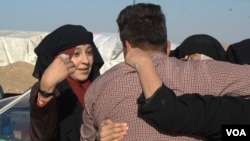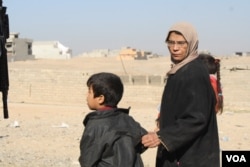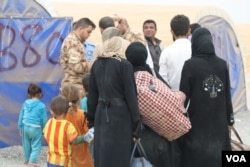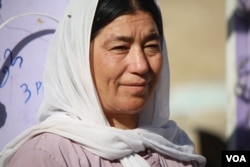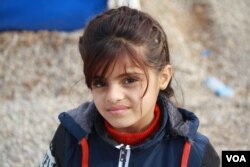Women who have escaped Mosul, Iraq, where military forces have been battling Islamic State fighters, say amid the terror and suffering imposed on them by IS rule are more subtle, but deeply disturbing abuses.
It was worth risking their lives, they say, to escape a world where strange men hurl insults and punishments at them for even the slightest infraction of IS 'rules.'
An ordinary shopping trip, for example, could be dangerous, says Issra, a 30-year-old mother of two from Mosul.
“I was dressed according to their laws in all black,” she said, describing a day at her local bazaar several months back, before snipers and mortar fire kept everyone inside. “I was wearing a veil, gloves and my feet were covered.”
An IS militant approached her outside a shop and ordered her to put on a second veil, so her eyes — the only part of her visible — also were covered. Then, under the loose-fitting black robes covering her from head to toe, the militant noticed the outline of trousers, forbidden to women even if they are unseen.
“He said, ‘Why are you wearing trousers? Shame on you,’” she recalled. The militant then followed her home.
“My father repeated the insults, telling me I was shameful for wearing pants,” she said. “He apologized to the militant and promised it would not happen again.”
When the militant left, her father apologized to her. He said he was simply trying to avoid being beaten or whipped. Commonly, husbands and fathers are punished for female dress code violations under IS rules, says Issra.
“Even brides are not allowed to wear white," she added.
Female guards
In parts of IS-held Mosul, stores are completely gender-segregated and female IS members patrol the shoppers, notes Issra’s husband, Abdel Hadi, standing outside a tent they moved into last week after finally fleeing the city.
“We called them ‘The Biters,’” he said, “because they bite women who break rules.’”
Infractions were not just punished with biting, he said.
One elderly woman from his neighborhood brushed her veil aside in a shop to have a closer look at the fabric she was considering buying, he said. A female guard saw the infraction and the woman was sentenced to a public whipping of 50 lashes.
Other punishments sound so harsh they are difficult to believe, and many women say they have heard of beatings, killings and imprisonment for dress code violations, but have not seen it happen.
What they have seen, says Hadi, is enough to make them believe anything.
“When they found someone with a mobile phone, they chopped off his head and left it on the bridge,” he said. “Written in red near the head was writing that said, ‘He was calling the Iraqi army.’”
The escape
Despite the daily indignities and the dangers, many families have lived under IS in Iraq for two-and-a-half years. Since the Mosul offensive began in mid-October, however, more than 85,000 people have fled their homes.
After a month of living as a battle raged around them, Hadi and Issra finally fled last week with their children, nine-year-old Mohammad and five-year-old Sa’ad, as the Iraqi army closed in on their neighborhood.
“Militants gathered 45 families and told us they would kill anyone that doesn’t retreat with them,” Issra said. “Mine and one other family climbed onto the roof and passed over seven rooftops before we got close enough to the Iraqi army to go down.”
The rest of the families, she says, remained with the militants, fearing slaughter.
At another refugee camp a few kilometers away, women tell similar stories of humiliation and horrors, saying they never had a chance to flee, so they waited for the Iraqi army to enter their neighborhood.
And while the army encouraged women to throw away their veils, says Fateeha, a mother of four from the Mosul suburbs, they fled gun and mortar fire, as well as the extreme poverty that appeared to have descended upon the entire region ruled by Islamic State.
“We were very happy when they told us to toss out our veils,” she said, smiling. “There are no words to explain it.”




